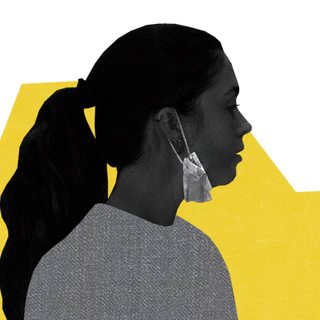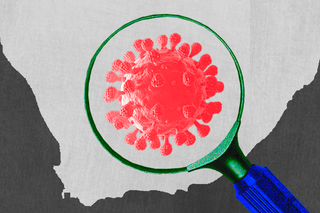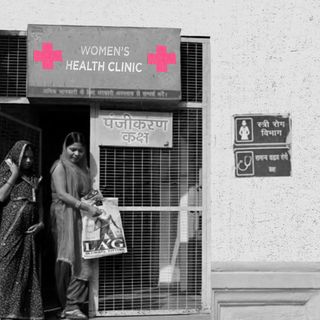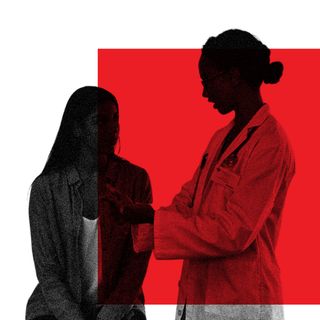
Omicron Variant Did Not ‘Originate’ in South Africa, It Was ‘Detected’ There. The Difference Matters
Singling out Southern African countries “is like banning the room with the smoke detector when there’s a fire in your house.”

Here are some facts about the new Omicron variant of the Covid19 virus. The first confirmed infections reportedlycame from foreign visitors to Botswana. Due to a robust testing and sequencing system, a South African scientist flagged it to the global health community. The World Health Organization noted the variant was first “reported” in South Africa. It somehow translated into the media, experts, and others calling it a “South African variant,” indicating the variant originated there. Now, most Southern African countries face travel bans from Western nations — some have likened it to “punitive measures” for the region’s transparency.
The highly-mutated variant of concern signifies uncertainty and the importance of vaccines. But the series of events indicates the knowledge gap that currently exists in the way vaccine information is communicated and acted upon.
Take the misinformation around Omicron’s origins, for instance. The first confirmed infection of Omicron was reported in Botswana around 11th November, which was later reported in South Africa too. Scientists who were sequencing the genome and identifying the mutations chanced upon the variation and shared it with others. This does not mean the variant “originated” in Botswana or South Africa. The individual nationalities are unknown. “Such detection should not be confused with Botswana being the country of origin of the strain,” Dr. Edwin Dikoloti, Botswana’s health minister, said in a press conference.
New findings even show the Omicron variant was spreading in the Netherlands before the first case was identified in Southern Africa. Cases of the new variant are also being identified in other countries (such as the U.K., Canada, China, and Israel)– because of the variant’s genome the South African scientist first identified.
This also makes the decision to ban travel from Southern African countries a knee-jerk reaction.
“The prohibition of travel is not informed by science, nor will it be effective in preventing the spread of this variant,” South Africa’s President Cyril Ramaphosa said in a speech on Sunday. “The only thing the prohibition on travel will do is to further damage the economies of the affected countries and undermine their ability to respond to and also to recover from the pandemic.”
Moreover, a raft of studies questions the efficacy of international travel bans. A study in the Journal of Emergency Management concluded there is little evidence to prove that international travel bans curb the spread without other public health measures, like isolation. With the Omicron variant, the WHO has already advised against travel bans. Moreover, “some of the cases have been directly linked to travel to southern Africa, others have been linked to travel from elsewhere and a few of Israel’s suspected cases are not linked to travel at all,” VerifyThis noted.
Singling out Southern African countries, who alerted the world about a new variant due to their robust labs, is misguided. It “is like banning the room with the smoke detector when there’s a fire in your house,” a Twitter user noted.
Related on The Swaddle:
What We Know About the New Covid Variant With ‘Horrific’ Mutations
The way media reports variant detection reveals how little we understand coronavirus sequencing. The misnomer in naming variants has a longstanding history. Think of the 1918 pandemic, which came to be known as the “Spanish flu” in public memory even though the exact origin of the virus remains unknown. If anything, the first confirmed case was in the United States. Some note that “because wartime censors minimized reports of the illness while the Spanish press did not,” the misconception prevailed. That is, the increased transparency about the spread was penalized.
There’s tangible damage this media misrepresentation can do. For one, calling B.1.1.529 the “South African variant” may perpetuate a cycle of racism and xenophobia. It is one the world is already familiar with; the “Chinese variant” is linked to rising in crimes against Asians throughout the world, similarly with the “Indian variant” when it emerged early this year. People are already searching for the “South African variant” on Google. Other countries where the variant is detected, such as the U.K., Canada, and Germany, further do not appear to be facing targeted travel bans; some have called this discrepancy self-fulfillment of the “racist” trope.
OMICRON, the new Covid mutant, is circulating in Europe, Asia, and Australia — and yet ONLY flights from Southern Africa have been banned. This must stop because it’s racist and discriminatory. And won’t stop OMICRON from further spread @WHO @DrTedros @PaulKagame pic.twitter.com/kDaDrZSTMv
Secondly, this is public health misinformation. Scientists note the way travel bans and variant reporting play out could lead to less scientific transparency. In that nations would be discouraged to report cases and may try to downplay the extent; something China reportedly did.
“You don’t want a situation where, a month from now, a country health minister … gets a result of sequenced virus and they say, ‘OK, if it is that widespread, it’s going to come out anyways from some other country, why be the first one?’ And that cycle starts,” Omer, of the Yale Institute of Global Health, told NPR. The travel ban, without any renewed public health measures, may also give people a false sense of complacency that the virus is under control.
Dr. Margaret Harris, a public health doctor and a spokesperson for the World Health Organization, urged governments to “make the most of that time. Build up your hospital capacity, build up your tracking and tracing, build up your surveillance, prepare.”
As of December 1st, 23 countries from five of six WHO regions have now reported cases of Omicron. Everything boils down to vaccine equity. Many have argued that low-income countries, in particular, show have the ability to produce their own vaccines.
“Instead of prohibiting travel, the rich countries of the world need to support the efforts of developing countries — economies, that is — to access and to manufacture enough vaccine doses for their people without delay,” Ramaphosa said.
Saumya Kalia is an Associate Editor at The Swaddle. Her journalism and writing explore issues of social justice, digital sub-cultures, media ecosystem, literature, and memory as they cut across socio-cultural periods. You can reach her at @Saumya_Kalia.
Related


Female Sterilization Is the Most Common Contraceptive as Few Men Use Condoms: NFHS
